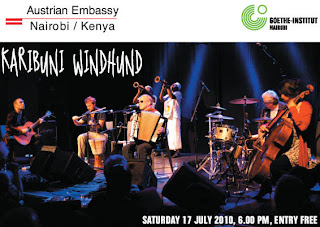On the evening of the 17th July 2010 I went down to the Goethe-Institut, in downtown Nairobi, for the highly publicized show titled Karibuni Windhund, featuring Windhund, an Austrian Band.
Windhund which features Otto Lechner playing the accordion, Melissa Coleman on the cello and Karl Ritter on the guitar and is greatly known for their improvised music which explores different culture and sound-worlds.
Without much ado, after the pleasantries of welcoming everyone and brief bio on the group, the show kicked off with the Windhund Trio first, doing a composition and then thereafter treated us all to an hour or so of pure improvised music.
To capture the scene for you in words: We witnessed and experienced instances where one (from the trio) would provide the lead and the others picking on it or backing him/her to produce amazing music.
In another instance you had the artists going off on each other, trying to outdo the other; it was improvisation at its best.
Also at display were the artists making sounds from their instruments in very unconventional ways- clearly improvisation in its literal sense!
Different emotions and experiences were evoked with each playing, producing a great sound.
I guess, from the above, the question that begs for an answer or an attempt at it- How is it that out of what is seemingly “chaotic” or “random” a great sound or music is produced to appreciation of the keen ear?
I think, a key ingredient, beyond the skill and one’s mastery, an intimate chemistry between the artists is critical.
And certainly this was evident within the group and in the way the blended each for their sounds to produce a great performance.
I truly enjoyed every bit it.

Comments
Post a Comment